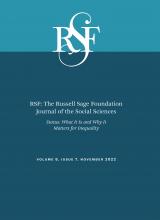Research Article
Open Access
Who Gets Accepted and Who Gets Rejected? Status in the Production of Social Science
Kevin Nazar, Roberta Spalter-Roth, James C. Witte
RSF: The Russell Sage Foundation Journal of the Social Sciences November 2022, 8 (7) 192-209; DOI: https://doi.org/10.7758/RSF.2022.8.7.10
Kevin Nazar
aDoctoral candidate in public and applied sociology at George Mason University, United States
Roberta Spalter-Roth
bSenior research fellow at George Mason University, United States
James C. Witte
cProfessor in the Department of Sociology and Anthropology and director of the Institute for Immigration Research at George Mason University, United States

REFERENCES
- ↵
- Allen, Walter R.,
- Susan A. Suh,
- Gloria Gonzales, and
- Joshua Yang
- ↵
- American Sociological Association (ASA)
- ↵
- American Sociological Association (ASA)
- ↵
- Bakanic, Von,
- Clark McPhail, and
- Rita Simon
- ↵
- Begg, Colin B., and
- Jesse A. Berlin
- ↵
- Blackwell, James E., and
- Morris Janowitz
- ↵
- ↵
- Bonilla-Silva, Eduardo
- ↵
- Bonilla-Silva, Eduardo, and
- David G. Embrick
- ↵
- Bourdieu, Pierre, and
- Jean-Claude Passeron
- ↵
- Bowles, Sam, and
- Herbert Gintis
- ↵
- Brewer, Rose M
- ↵
- Burawoy, Michael
- ↵
- Calhoun, Craig, and
- Jonathan Van Antwerpen
- ↵
- Camic, Charles,
- Neil Gross, and
- Michele Lamont
- ↵
- Collins, Patricia H
- ↵
- Collins, Patricia H
- ↵
- Collins, Patricia H., and
- Sirma Bilge
- ↵
- Crane, Diana
- ↵
- Crenshaw, Kimberle
- ↵
- CSMGEP
- ↵
- Darity, William A., Jr.
- ↵
- Delgado, Alberto Falk, and
- Anna Falk Delgado
- ↵
- ↵
- Embrick, David G
- ↵
- Flahrety, Colleen
- ↵
- Fortunato, Santo,
- Carl T. Bergstrom,
- Katy Börner,
- James A. Evans,
- Dirk Helbing,
- Staša Milojević,
- Alexander M. Petersen, et al.
- ↵
- ↵
- Golde, Chris M., and
- George M. Walker
- ↵
- Helmer, Markus,
- Manuel Schottdorf,
- Andreas Neef, and
- Demian Battaglia
- ↵
- King, Mollie M.,
- Carl T. Bergstrom,
- Shelley J. Correll,
- Jennifer Jacquet, and
- Jevin D. West
- ↵
- Korom, Philipp
- ↵
- Laland, Kevin N
- ↵
- Lamont, Michele, and
- Katri Huutoniemi
- ↵
- ↵
- Moody, James
- ↵
- Moore, Kyle K.,
- Ismael Cid-Martinez,
- Jermaine Toney,
- Jason A. Smith,
- Amber C. Kalb,
- Jean H. Shin, and
- Roberta M. Spalter-Roth
- ↵
- Moore, Mignon R
- ↵
- Nielsen, Mathias Willum, and
- Jens Peter Andersen
- ↵
- NSF
- ↵
- NSF
- ↵
- Olson, Steven, and
- Adam P. Fagen
- ↵
- Pettigrew, Thomas F
- ↵
- Radicchi, Phillip,
- Santo Fortunato, and
- Claudio Castellano
- ↵
- Reskin, Barbara F., and
- Patricia A. Roos
- ↵
- Ridgeway, Cecelia
- ↵
- Spalter-Roth, Roberta
- ↵
- Spalter-Roth, Roberta, and
- William Erskine
- Spalter-Roth, Roberta,
- Jean Shin,
- Olga Mayorova, and
- Patricia White
- ↵
- Spalter-Roth, Roberta,
- Jean Shin,
- Jason A. Smith,
- Amber Kalb,
- Kyle K. Moore,
- Ismael Cid-Martinez, and
- Jermaine Toney
- ↵
- Upthegrove, Rachel,
- Angharad De Cates,
- Alice Shuttleworth,
- Derek. K. Tracey,
- Matthew R. Broome, and
- Anne Lingford-Hughes
- ↵
- Walker, George E.,
- Chris M. Golde,
- Laura Jones,
- Andrea Conklin Bueschel, and
- Pat Hutchings
- ↵
- ↵
- Weber, Max
- ↵
- Wellmon, Chad, and
- Andrew Piper
- ↵
- West, Jevin D,
- Jennifer Jacquet,
- Molly M. King,
- Shelly J. Correll, and
- Carl T. Bergstrom
- ↵
- Williams, Monica T
- ↵
- Zambrana, Ruth Enid,
- Adia Harvey Wingfield,
- Lisa M. Lapeyrouse,
- Brianne A. Davila,
- Tangere L. Hoagland, and
- Robert Burciaga Valdez
- ↵
- Zuberi, Tukufu, and
- Eduardo Bonilla-Silva
In this issue
Who Gets Accepted and Who Gets Rejected? Status in the Production of Social Science
Kevin Nazar, Roberta Spalter-Roth, James C. Witte
RSF: The Russell Sage Foundation Journal of the Social Sciences Nov 2022, 8 (7) 192-209; DOI: 10.7758/RSF.2022.8.7.10
Jump to section
Related Articles
- No related articles found.
Cited By...
- No citing articles found.





